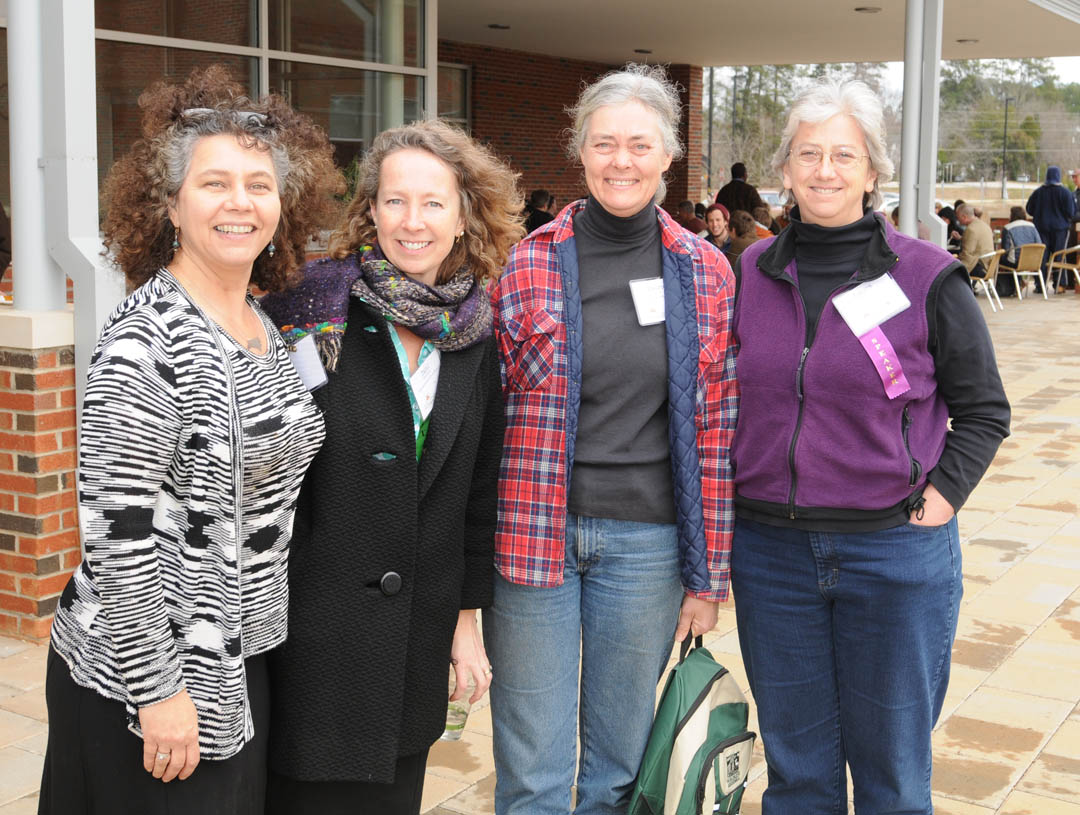
College News
Farming Conference at CCCC focuses on climate change
03.18.2013 • College & Community, Special Events
PITTSBORO - Many of the state's most influential agricultural agencies met with North Carolina farmers on Feb. 8 to collaborate on how climate change could impact farming.
Held at Central Carolina Community College's Chatham County Campus, the conference, "Farming Strategies in Today's Changing Climate," offered sessions dealing with managing uncertainty and risk, vulnerability assessment of annual and perennial crops and livestock, and other areas of study. The conference paired conventional and sustainable farmers with agricultural scientists to discuss adaptation strategies for farming in a changing climate.
Approximately 150 people attended the conference, which was sponsored by the college, The Abundance Foundation, Center for Environmental Farming Systems, Carolina Farm Stewardship Association, Chatham County Extension Agency, North Carolina Strawberry Association, The American Livestock Breeds Conservancy, and Rural Advancement Foundation.
"Climate change is not something that is going to happen," said Nancy Creamer, director of the Center for Environmental Farming Systems. "It's something that is affecting farmers right now."
According to the Environmental Protection Agency, warmer temperatures may make many crops grow more quickly, but could also reduce yields. Higher CO2 levels can increase yields, but some factors may counteract these potential increases. More extreme temperature and precipitation can prevent crops from growing at all. Many weeds, pests and fungi also thrive under warmer temperatures, wetter climates and increased CO2 levels.
Dr. Laura Lengnick, director of the Sustainable Agriculture program at Warren Wilson College and recent visiting scientist on the USDA national program staff, was the keynote speaker for the event. She was joined by State Climatologist Dr. Ryan Boyles.
The conference identified new research projects, updated farmers on current research and will produce a comprehensive summary of its findings. A task force was also formed to address the immediate needs of farmers in adapting to climate change.
Lunch, procured from produce located within 50 miles of the conference site, was provided by CCCC's Sustainable Agriculture and Natural Chef Culinary programs. An end of the day socializing event was held at the Piedmont Biofuels and Biofarm campus.
"The climate is warming, farmers need to plan for climate change by becoming more resilient," said Laura Lauffer, Sustainability Coordinator and lead instructor for the Sustainability Technologies program at CCCC's Chatham County Campus. "That means changing crop rotations, disease management and even species selection for livestock."
CCCC student Tim Kein said the most compelling information he gained at the conference is how adaptable farmers must be.
"Farmers must be able to react quickly and effectively to changing climate conditions and be even more attentive to animals, insects and plants in order to read the weather," said Kein, who will pursue a career in health and wellness. "They must also be constantly creating new ways to grow and protect their crops from extra hot summers and too much rain or not enough. Many old rules no longer apply, and this new generation of farmers must use intuition as well as technical ability to be successful."
The Sustainable Agriculture program was established at CCCC's Chatham County campus in 1996 by local farmers in association with the Cooperative Extension Agency, Provost Karen Allen and North Carolina State University to provide training in organic and sustainable agriculture. Approximately 75 students are currently enrolled in the program.
For more information on the Sustainable Agriculture program at CCCC, contact Laura Lauffer, Sustainability coordinator, 919-545-8032 or by e-mail at llauffer@cccc.edu.

Central Carolina Community College's Chatham County Campus hosted a Feb. 8 conference, 'Farming Strategies in Today's Changing Climate,' to bring together many of the state's most influential agricultural agencies and farmers. The conference offered sessions and discussions on adaptive strategies for farming in a changing climate. Approximately 150 people attended the conference. Among the organizers of the event were (from left) Laura Lauffer, CCCC Sustainability coordinator/Sustainability Technologies lead instructor; Tami Schwerin, executive director, The Abundance Foundation; Laurie Heise, owner and operator of Wiseacre Farm in Chatham County; and Dr. Laura Lengnick, director of the Sustainable Agriculture program at Warren Wilson College. For more information on the Sustainable Agriculture program at CCCC, contact Laura Lauffer, Sustainability coordinator, 919-545-8032 or by e-mail at llauffer@cccc.edu.
- Central Carolina Community College
- Serving Chatham, Harnett, & Lee Counties, NC
- 1-800-682-8353

